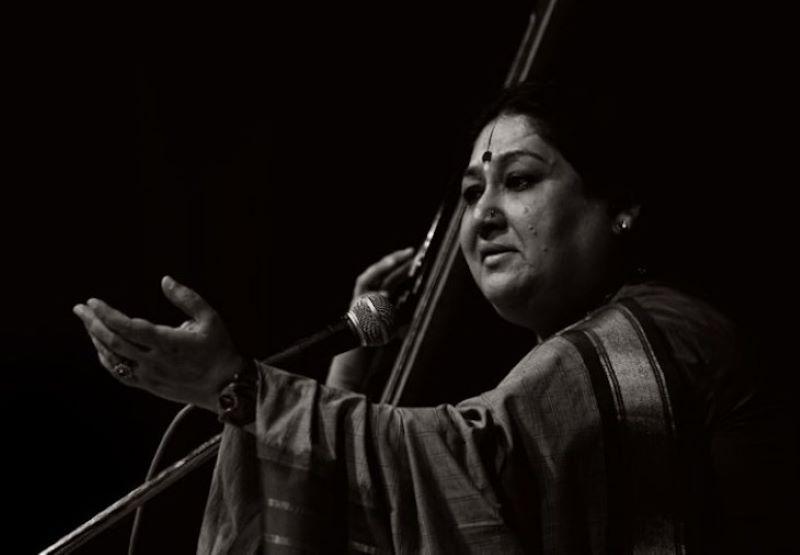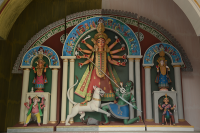 Image
Image
Gharana is important for student of music: Shubha Mudgal
Indian singer of Hindustani classical music, Shubha Mudgal, was the guest at 'Sur Aur Saaz' event organised by Prabha Khaitan Foundation in association with Ehsaas Women on Jul 27. In an interaction with Indian classical vocalist Kaushiki Chakraborty, Mudgal spoke about her journey as a singer at length besides giving her take on the raging nepotism debate. India Blooms correspondent Souvik Ghosh brings excerpts
How did you realise that you should have a career as a singer?
I grew up in a family of academicians and people who were teaching English Literature, but my parents were absolutely, passionately fond of the arts and they did their best to give me and my sister every opportunity to engage with all kinds of arts. My parents had also encouraged me to learn the dance form of art. So I started learning Kathak. My parents never indicated that arts were something one could only do during leisure times. They encouraged me to continue with dance and music besides studies. So it was always a question of deep reverence for the arts and a deep feeling that engaging with the arts only enriches one's life.
When did you discover the calling to become a singer?
Actually, I didn't discover the calling. Shortly after my graduation, my mother sat me down and said she could make out that I was crazy about music. My mother said I will have to fully commit to music if I want to do it and need not do what everybody else does. She said she would give me a year off to take a decision whether I wanted to pursue music. It just took a month to decide that music is something which I wanted to do (smiles).
.png)
How important is to have a guru (teacher/master) in pursuing the arts, particularly at a time when people are learning stuff from online platforms?
I think in the Hindustani tradition of classical music, the presence of a guru is all important. A guru is not just a teacher. The relation between guru and shishya (disciple) in the sphere of Hindustani music is all about giving a customised individual training to each learner. Despite having a style of teaching or a template they may follow, each guru actually customises training for each shishya and that is what is so important.
The world has changed completely in the last 20-25 years. Do you think the shift has affected any way the process of learning?
I think tradition is dynamic. It's constantly changing. So yes, the changes are happening. The interactions and the time spent with gurus nowadays due to time constraints may have become compressed. Therefore, we have to think how to be able to share with them (disciples) in the most effective manner. At the same time, there are certain strengths which were not there earlier.
We can now avail online platforms for follow ups if in case our students are not able to come for classes owing to unavoidable circumstances like rains or riots, though the technology has its own challenges I have to say. But follow ups can be done in many ways, which were not possible in earlier days.
.png)
How much do you believe in the traditional definition of gharana at a time when information is available all around?
Gharana is very important for a student of music. I respect the tradition of the gharana because it really provided for some of the iconic styles of looking at music. And at the same time, the gharana tradition itself shows us with ample illustrations that within a gharana, the tradition commits you to be yourself. I think it's a revelation that tradition itself is such that it allows one to be himself or herself, while retaining certain familial characteristics of the gharana of music. So I think gharana is really important but at the same time, I do believe the pathbreakers have shown us how within a gharana, one can forge a style which is unique.
You are very socially active, politically aware and stand for the right causes besides being a singer. How do you manage so many things at a time?
If you look at the great pioneers of Hindustani classical music, many people have done multiple things. When I look back at the history of Indian music, I wonder what we are doing and why we are not able to change things. The examples are set by our pioneers. It is very tough to balance things but I feel very blessed to have the gift of music in my life. If I spare some time to think of the larger fraternity of musicians, that's what I should be doing actually. My very existence and identity in a sense has been created by the gift of music in my life.
.jpg)
How far do you think nepotism, which is getting debated all around now, is applicable to art?
I don't think anybody will give a young musician an opportunity for too long if they are not good at their work. A musician with a lineage may get a few more opportunities but not for long, if he or she is not good at their art. A musician may have a weakness for his children or favourite disciple but unless the disciple proves his merit as musician, how long will he be given a chance? So the accusation of some are getting more concerts is because the audience likes them. It can be due to a variety of reasons but not certainly due to only nepotism or favouritism.
Top Headlines
-
Art and Culture
Rich tribute to Bhupen Hazarika at Kolkata Book Fair marks birth centenary
January 29, 2026
-
Art and Culture
Kolkata Vistiwalas: The Last Bearers of Water
January 16, 2026
-
Art and Culture
Beyond Old and New: Bickram Ghosh and the Art of Fusion at Serendipity
December 25, 2025
-
Art and Culture
Saptak Music School of Pittsburgh hosts spellbinding evening of Indian classical music
September 23, 2025
-
Art and Culture
Zigzag to clarity: Sonal Mansinghs dance of life captivates Delhi
September 08, 2025
-
Art and Culture
USA: Santoor Ashram Kolkata mesmerises Los Angeles with a celebration of Indian classical music
August 27, 2025
-
Art and Culture
'Feels like a tonic in my musical pursuits': Flute virtuoso Pandit Ronu Majumdar receives Padma Shri
June 06, 2025
-
Art and Culture
Of Paris, a chronic pain and a pivotal friendship: Frida Kahlo meets Mary Reynolds at the Art Institute of Chicago
April 16, 2025
-
Art and Culture
Prabha Khaitan Foundation celebrates 'Vasant Utsav' at Indian Museum Kolkata
March 15, 2025
-
Art and Culture
Musical concert 'Ami Bhalobashi Bangla Ke' to be held in Kolkata on April 19
February 20, 2025

